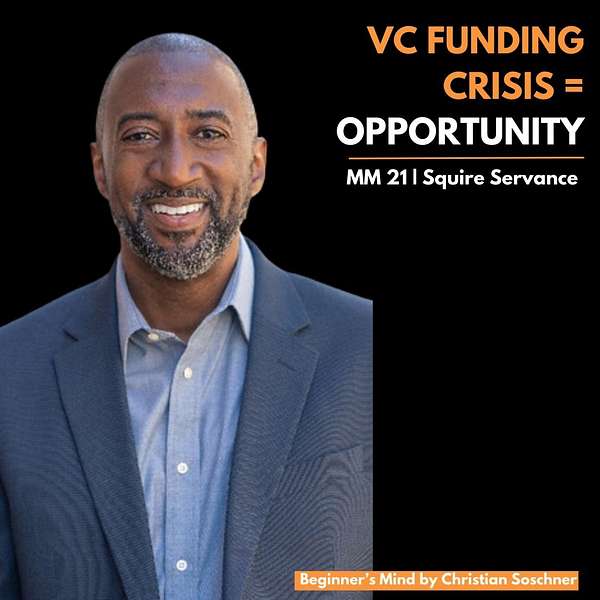
Beginner's Mind
Blueprints for Builders and Investors
Hosted by Christian Soschner
From pre-seed to post-IPO, every company—especially in deep tech, biotech, AI, and climate tech—lives or dies by the frameworks it follows.
On Beginner’s Mind, Christian Soschner uncovers the leadership principles behind the world’s most impactful companies—through deep-dive interviews, strategic book reviews, and patterns drawn from history’s greatest business, military, and political minds.
With over 200 interviews, panels, and livestreams, the show ranks in the Top 10% globally—and is recognized as the #1 deep tech podcast.
With 35+ years across M&A, company building, board roles, business schools, ultrarunning, and martial arts, Christian brings a rare lens:
What it really takes to turn breakthrough science into business—how to grow it, lead it, and shape the world around it.
🎙 Expect each episode to deliver:
- Founder & Investor Blueprints: How breakthrough technologies scale from lab to IPO
- Historical & Biographical Frameworks: Timeless playbooks from the world's great builders
- Leadership & Communication Mastery: Tools to inspire, persuade, and lead at scale
Whether you're building the next biotech success, investing in AI, or leading a climate tech company through hypergrowth—this podcast gives you the edge.
Listen in. Apply what matters. Build companies that last.
📬 Join the newsletter & community: https://lsg2g.substack.com/
Beginner's Mind
MM21: Mastering Venture Capital in a Volatile Market: Insights from a Life Science Investor
Venture capital funding is drying up, but is this a crisis or an opportunity? Squire Servance, founder of Syridex Bio,, explains the "denominator problem," why savvy investors are targeting overlooked assets, and how his fund addresses health disparities.
Link to full episode
Join the Podcast Newsletter: Link
Are you ready to turn market downturns into strategic wins? In the next few minutes, squire Servance, founder of Zuritex Bio, unveils how current venture capital funding challenges create unique opportunities for savvy investors. Discover how to acquire valuable assets, address health inequities and thrive in a changing landscape. Thank you, thank you. We had a similar topic this morning with Owen Reynolds from Teclas Ventures. He's from the US, migrated to Europe. Some people do that. We touched on that and he also mentioned that we had two IPOs recently Arm and Instacart. When I look at the dynamics, I mean I hope I remember it right. The latest post I've read on LinkedIn about the Instacart IPO was that the latest investors on the private market in the last round before the IPO got a 75% cut in the evaluation. So I mean, when this hits the balance sheets, the hand of the VCs, and they reported back to the LPs and say I mean, yeah, we recovered 25%, what's your opinion? How will that be taken by LPs? Could that motivate them to put more money into the market?
Squire Servance:Sorry, can you repeat that last question?
Christian Soschner:I mean with Instacart. I remember that the valuation cut from the last private round to the IPO valuation was about 75%, so the investors lost money. And I was just thinking, I mean, what's the message to LPs when we have such IPOs?
Squire Servance:Well, I mean, there's no crystal ball on how companies are going to play out. The markets are. You know, for the most part, try to be efficient. You know what I taught when I talked to LPs, you know, and it's generally that you know, you have to describe how you view IPOs. I kind of generally view it as just it's another fundraising mechanism, right, but you know the way I focus definitely in the life sciences space, because I get questions around your focus on health equity. How big is that market? What do you? What does that mean?
Squire Servance:And you know, we kind of define these health equity diseases where there's a great health disparity on a variety of different dimensions. But when we look at it it's, it's a global market. The diseases that we we're looking at just financially, from global market share perspective, are over half a trillion. So, um, it is a big market where we're playing in right now. And we couple that with the fact that our strategy is specifically around venture creation, so acquiring assets, acquiring products and building companies.
Squire Servance:And we're in a place now where I think around 66, 67% of CEOs at biotech and pharma companies are looking to divest products. So we're able there's a great market to acquire products for us. We think it's going to be a great opportunity to for exits in the future, given how the landscape of biotech and pharma is playing out. The big drivers are it's about $200 billion of revenue at risk tied to patent expirations over the next seven to 10 years and there's gaps in pharma company pipelines, and so you have access to products now. Three to seven years, we think, is the opportune time where you know pharma companies biotech are going to deploy their you know they're sitting on a lot of cash now and deploy that cash to fill the gaps in their pipeline. And so when I talk to LPs, that's the conversation that I'm having around the landscape, specifically in life sciences space.
Christian Soschner:Yeah, I totally agree. I mean, the market is down and this is always the best time to invest. The valuations are low. Two years ago the valuation were just mesmerizing. I think also in public markets are the public life science companies that are pre-market. I think the CRISPR and Telia are 60% down from the no-transcript. If you found Squire's insights valuable, please link, comment and subscribe to the channel. Your support helps to continue bringing impactful perspectives from experts in venture capital and healthcare innovation to you, the listener.
